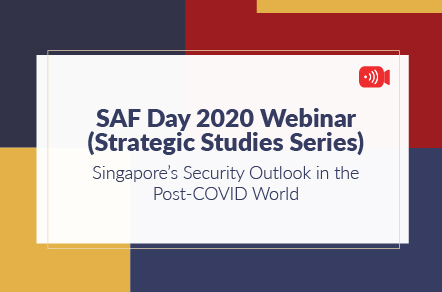

The Military Studies Programme (MSP), RSIS, organised a SAF Day 2020 webinar titled “Singapore’s Security Outlook in the Post-COVID World”. Three RSIS scholars (Dr Kumar Ramakrishna, Mr Muhammad Faizal and Dr Ong Wei Chong) presented on various security challenges facing Singapore and the region in the age of COVID-19. The webinar is part of the MSP’s Strategic Studies Series.
The Evolving Threat of Terrorism and Militancy in Southeast Asia and Beyond: Why Total Defence Remains Relevant in the Age of COVID-19
Dr Kumar Ramakrishna, Associate Professor and Associate Dean, Head of International Centre for Political Violence and Terrorism Research, Research Adviser to National Security Studies Programme, RSIS, presented on the evolving threat of transnational terrorism to Southeast Asia and Singapore. He drew upon recent examples of both violent Islamist and white supremacist attacks and emphasised the principle of reciprocity that exists between these two transnational terrorist threats. In light of the COVID-19 pandemic, Dr Ramakrishna shared that the outbreak has not brought about a transformational impact on terrorism threats, but has added some complexity to the operational and ideological aspects of transnational terrorist threats. Dr Ramakrishna rounded up his presentation with a discussion on the enduring relevance of a “Total Defence” approach — highlighting the need to engage women, youth, social media companies, and religious leaders in an effort to present a whole-of-society approach towards terrorism and extremism as opposed to reliance on a “purely kinetic solution”.
Information Operations and Cybersecurity in COVID-19 World
Mr Muhammad Faizal, Research Fellow with the Centre of Excellence for National Security, RSIS, presented on how the cyberspace domain has increasingly been leveraged by threat actors not only as precursors to acts of violence, but as an effective means and force multiplier to conducting conflict and foreign interference. In his presentation, Mr Faizal argues that cyberspace threats aim to manipulate the target nation by weakening its national institutions and people. In a world struck by the pandemic, geopolitical tensions are further entrenched and cyber (and cognitive) attack surfaces are expanded. Mr Faizal concluded by sharing how Singapore as a Smart Nation, must continue to keep its cyber defences strong. This is especially crucial in terms of enhancing cyber security across social media domains, mobile devices, cloud computing networks, and critical infrastructure.
The Rise of Hybrid Warfare in the Asia Pacific
Dr Ong Wei Chong, Assistant Professor at RSIS, presented on the manifestation of hybrid warfare and grey-zone conflict in the Asia-Pacific region. Besides defining the concepts of hybridity and grey zone conflict, Dr Ong also contextualised these key concepts on why and how a multi-dimensional approach to strategy can be an attractive strategic option for state and non-state actors. Specifically, in the context of Southeast Asia, Dr Ong shared that poorly governed grey zones were exploited by IS and that the current Southeast Asian IS network comprises a range of actors: returning fighters, foreign fighters, fund raisers, local jihadists, and other criminal elements. Dr Ong summed up his presentation by urging participants to consider the limits of military power, and how there is perhaps a need for states to develop a range of options below the escalatory threshold to effectively respond to these hybrid threats.
Catch it here on the RSISVideoCast YouTube channel:




















